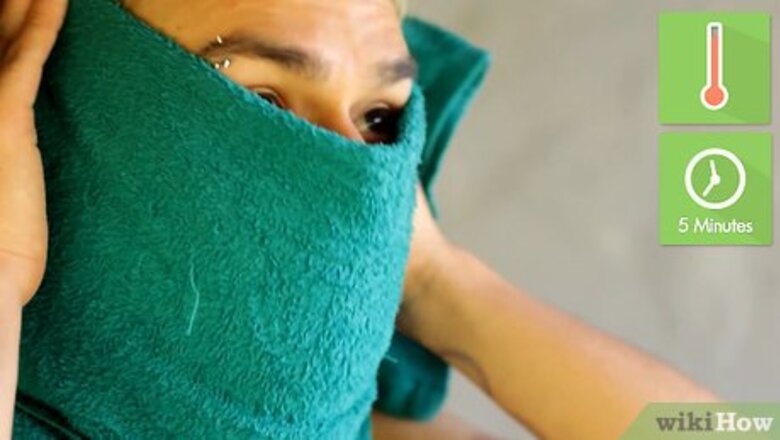
views
Lathering up
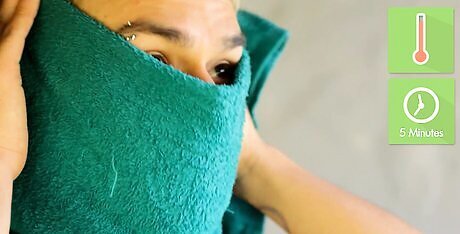
Hydrate your face with hot water. Take a hot shower and let the water wash over your face for five minutes. You’ll open up your pores and soften whiskers, making shaving much easier. You may also wrap a hot towel around your face like barbers do for their customers. Soak a small towel in hot water and hold it firmly against your face until the towel cools.

Rub pre-shave oil over your face. A good pre-shave oil can help make shaving easier. Look for products containing natural oils such as jojoba, coconut, olive, or sunflower. These oils help soften your beard without stopping your razor.
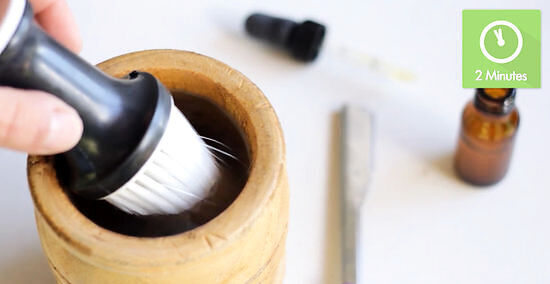
Soak your shaving brush in hot water. Fill your shaving bowl or mug with hot water. Make sure the water is hot so it softens the bristles on your brush. Leave the brush to soak for a minute or two. Afterwards, pick up the brush and flick your wrist to get rid of excess water. The highest quality shaving brushes are made of badger hair. Boar bristle brushes are cheaper, and synthetic brushes are of the lowest quality. You may work the soap or cream into your whiskers with your fingers, but a brush makes it a lot easier.
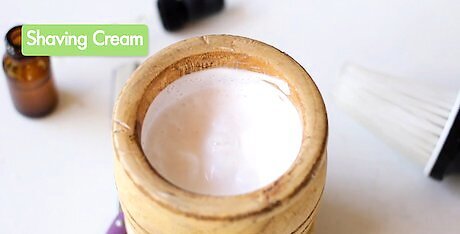
Place shaving cream or soap on the bottom of your shaving mug. Dump out the water in your mug or bowl. Replace it with nickel-sized dollop of shaving cream or the entire soap cake. Soaps are the cheaper option and are made with a high fat, vegetable oil glycerine mixture. Creams are similar to soaps and you should look for ones with natural essential oils like jojoba or coconut oil. Avoid common shaving gels and foams. Although you can use these, they won’t give you as good of a shave as quality soaps and creams.
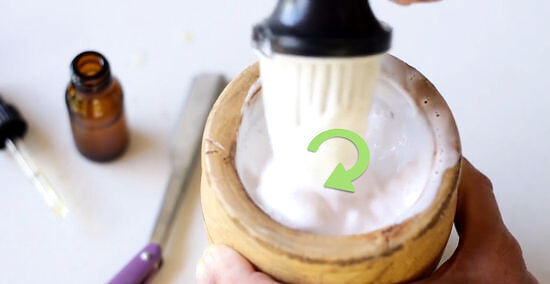
Make a lather with the brush. Place the dampened brush in the mug. Stir to work the soap or cream into a lather. The more you stir, the thicker your lather will be.
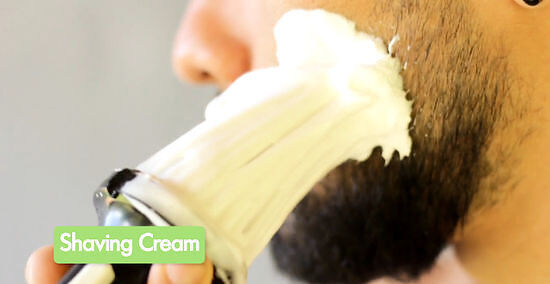
Brush the soap or cream into your whiskers. Use the brush to pick up the lather. Move in circular motions over the area you wish to shave, taking care to cover every single hair. Once you’ve applied enough lather to cover the area, use a few brush sweeps to smooth over any peaks.
Shaving with the Razor
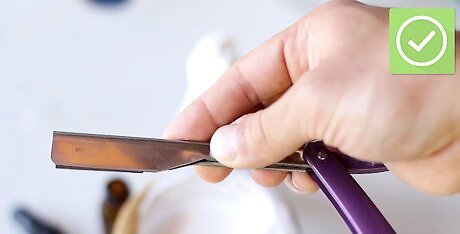
Grip the shank between your thumb and three fingers. Even though the razor has a wood or plastic handle, you don’t hold it. Instead, place your thumb under the blade on the shank (the piece of metal connecting to the handle). Your index, ring, and middle fingers go on the opposite side of the shank. Finally, place your pinky on the tang, which is the small piece of metal on the outside of the handle. This is the basic grip, and many people adjust it over time for greater comfort or directional control.
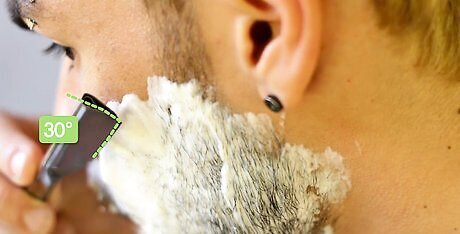
Hold the blade at a 30° angle to your skin. The blade should not be flat against your skin or directly pointed at it. Instead, turn it slightly so the sharp part of the blade points downward at your skin. The handle should be out near your nose.
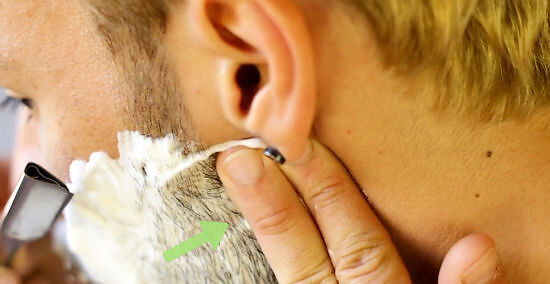
Stretch your skin with your opposite hand. Start with one side of your face. Use your free hand to pull up on your skin to make it flatter and smoother. Do this for every area you shave, since it gives you a smoother shave with less nicks.
Shave with the grain on the sides of your face. Hold the razor at the proper angle and start at the top of your cheek. Since the hair grows downwards here, work downwards towards your jaw and chin. Gently stroke the razor downwards in one smooth, controlled motion. Rinse off the blade and continue where you left off. Rinse off the blade after every stroke. Do this for both sides of your face. Even experienced straight razor users make mistakes from time to time. When starting out, you will cut yourself. Don’t be discouraged. Press the skin together for a few minutes to stop bleeding or apply styptic powder. EXPERT TIP Timmy Yanchun Timmy Yanchun Professional Barber Timmy Yanchun is a Professional Barber and Co-Founder of Svelte Barbershop + Essentials. Svelte Barbershop + Essentials is a men’s grooming company, specializing in men’s hair, beard, skin, and shave products, originally located in the SLS Hotel in Beverly Hills, California but has now branched out to 3 locations across Los Angeles. Timmy has been cutting hair since age 13 and opened his first of 6 barbershops at age 18. He is also the co-founder of the newly launched brand LTHR, the world's first wireless hot lather machine for barber quality shaves at home. Timmy and Svelte have been featured in GQ, Men's Fitness, and Hypebeast. Timmy Yanchun Timmy Yanchun Professional Barber Expert Trick: To get comfortable using a straight razor, start by putting shaving cream on a balloon. Then, hold the balloon in front of your face and use the razor to remove the shaving cream. Go really easily, using your wrist to guide the razor along the curves of the balloon. If you can do that without popping the balloon, you should be okay to try shaving your face.
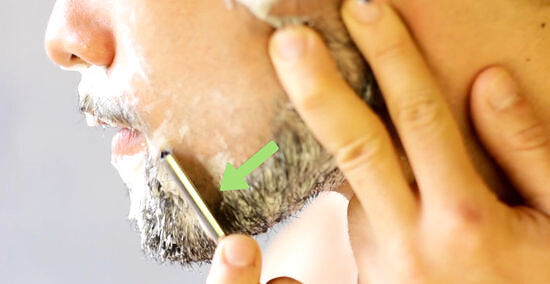
Shave your chin and upper lip. The easiest way to get your chin is to continue on from the sides of your face. The skin here is easy to cut, so use short, gentle strokes to move towards your point. Pull your lips tight to cut around them.
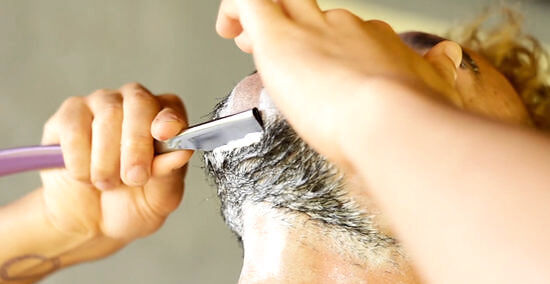
Shave under your jaw and down your neck. The rest of your face is done the same way as the sides. Tilt your head back, pull up on your jaw with your free hand, and stroke downwards to get the area under your jaw. Once you’ve taken care of your jaw area, move down your neck.
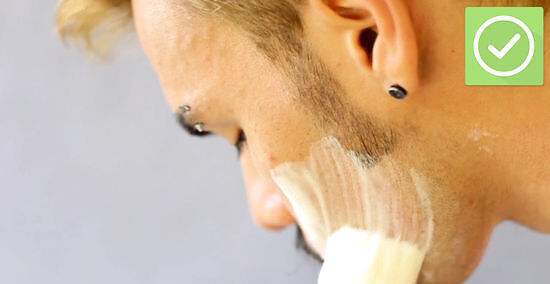
Lather up and make a second pass across the grain. Wash off your face and lather up as you did before. This time, you need to cut from side to side. Press more gently than you did the first time. Move from your ears to the center of your face. Rinse after each stroke. When you’re first starting, consider finishing by doing a second pass with downwards strokes. This way, you can get used to handling the blade without the extra risk of cuts.
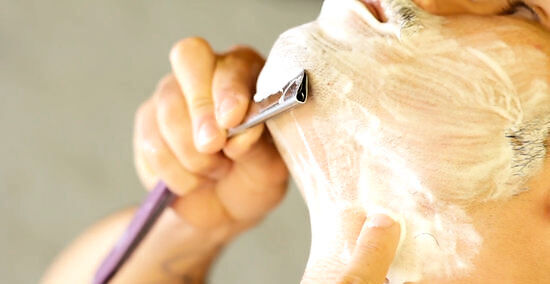
Lather again and make a final pass against the grain. Rinse off again and re-lather with hot water and soap or cream. The third pass will give you the closest shave possible. Work up from the bottom of your neck. Be as gentle as possible to avoid cuts.
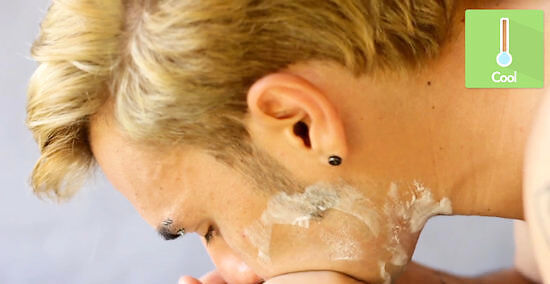
Rinse your face with cold water. Cold water will moisturize your skin while closing the pores. You may also apply aftershave, such as those with witch hazel or bay rum, to reduce irritation. Pat your skin instead of rubbing water or product into it.
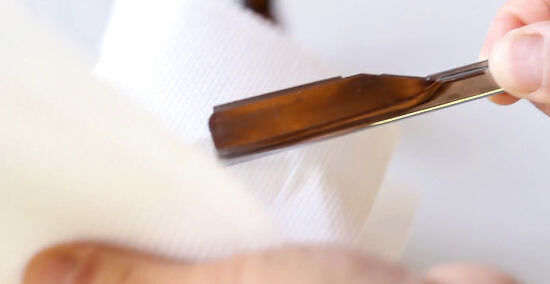
Dry the razor. Wipe off the blade with a soft cloth. Even toilet paper will work here. It’s important to remove all moisture so the blade doesn’t rust. Store the blade away from all moisture, including shower steam. When storing the blade for a longer period of time, cover it with a blade oil such as camellia oil.
Stropping Your Blade
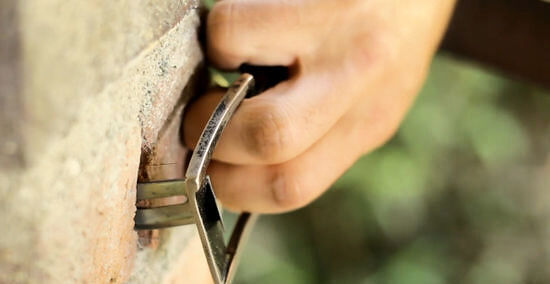
Hang the strop on furniture. Hanging strops have a hook you can attach to a solid surface, such as a bedpost or knob on a bathroom drawer. After every shave or honing, you should take time to strop your razor. It’ll smooth out the edges and give you a better, more comfortable shave. The canvas side works well enough between shaves. After honing, use the leather side.
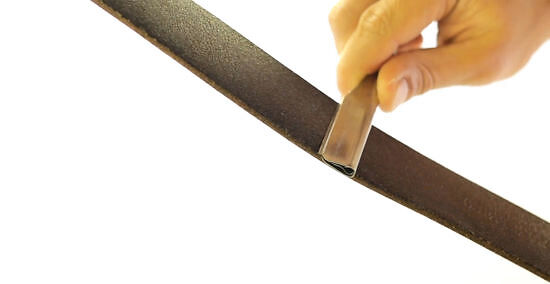
Hold the handle of the blade against the far end of the strop. Pull the strop tight with your free hand. Move the blade to the far end of the strop. Hold the blade by the shank, keeping the sharp edge pointed away from you.
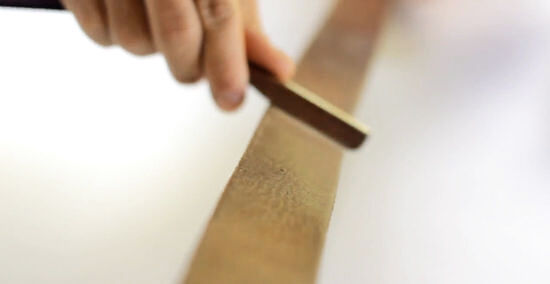
Stroke the blade toward you. Make sure the strop is pulled tight, or else you’ll end up with a rounded blade. Stroke the blade all the way towards you while holding it against the strop. Make sure you use light pressure and don’t lift the blade at all.
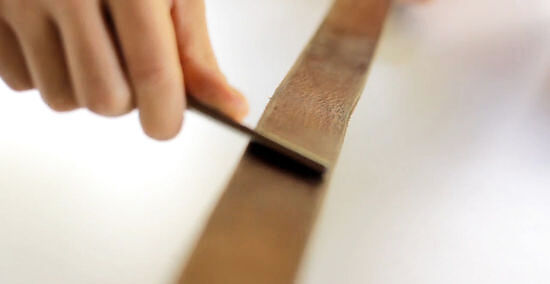
Flip the blade and stroke backwards. Roll the blade over on its spine. Don’t let the sharp edge touch the strop. The edge should now face towards you. Run the blade along the strop to the other end the same way you did before.
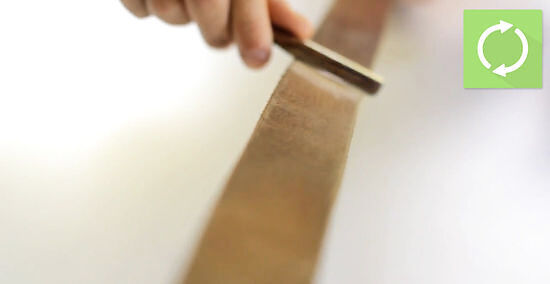
Repeat stropping until your blade is smooth. Usually you will need about 30 strokes, which amounts to 15 for each side. You can’t strop the blade too much. When you begin, move slowly and gently. As you learn you will be able to move faster and find that stropping takes no time at all.
Honing Your Blade
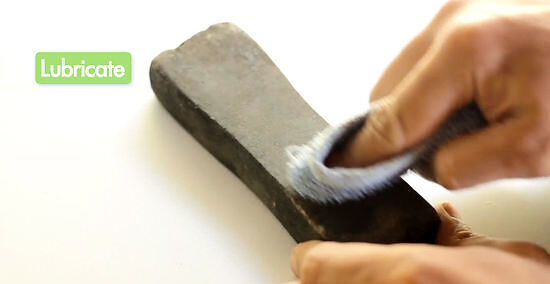
Wipe off and lubricate your whetstone. First, towel off the whetstone or ceramic hone to remove any residual debris. Lubricate the whetstone by covering it with cold water, oil, or your shaving lather. This lubricant protects against heat and particles that can damage the blade. Whetstones, such as the Norton 4,000/8,000 Grit Combo, can be found at hardware stores. Don’t use a cheap whetstone that you’d use for a knife. Ceramic barber hones must be bought online through sites like eBay. These are not as coarse as whetstones.
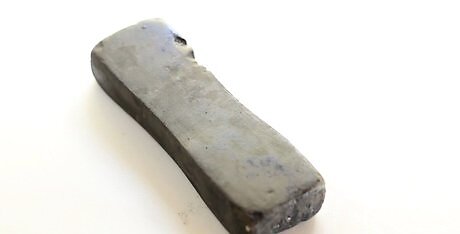
Lay the stone flat with the coarser side up. Find the side with the higher grit count or coarseness. This is the one you want to use to give your razor the proper sharpness.
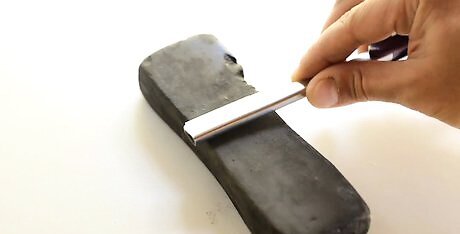
Place the razor flat on the edge near you. Start at one of the short sides of the whetstone. Both the sharp and blade edge of the razor should touch the stone. Keep the sharp end pointed away from you. Hold the shank with the tips of your fingers. Set a fingertip on your other hand to control the blade.
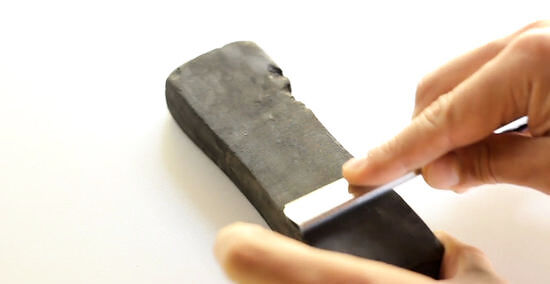
Sweep the blade along the stone. Use your fingers to push the blade along the whetstone. Keep moderate pressure on the blade as you work. If the blade is wider than the stone, you’ll have to sweep it forward as you move it. Start with the bottom of the blade. Push the top part of the blade onto the whetstone as you stroke.
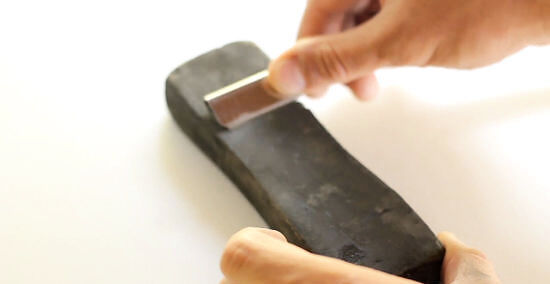
Flip the razor over and stroke backwards. Roll the razor over onto its back. Don’t touch the whetstone with the bladed edge. Instead, set the razor so that edge faces towards you. Push the blade away from you with the same steps you used before.
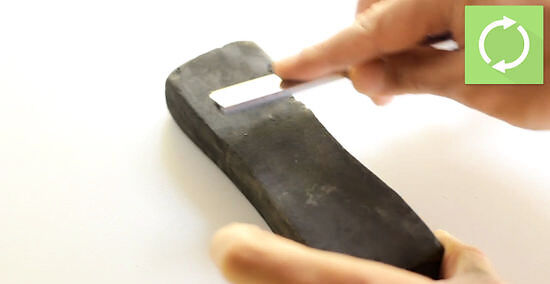
Repeat honing until your blade is sharp. You’ll need to stroke the blade about ten times in each direction. Test the blade by lightly dragging it across a moistened fingernail. If it digs in without sticking, it’ll be honed. Don’t continue to sharpen a honed razor or else you’ll damage it. Strop it first before you use it to shave. Your blade will stay honed for six to eight weeks. Stop the blade after every shave to maintain the sharpness until honing is needed again.













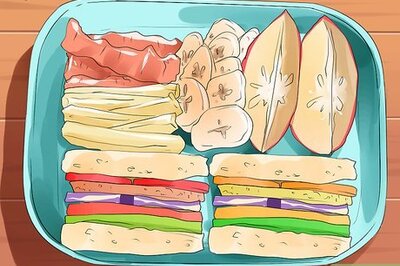
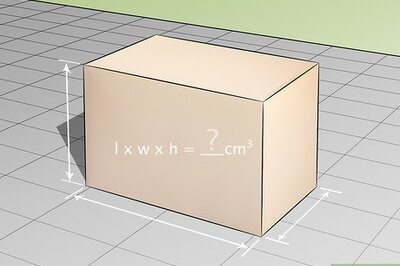

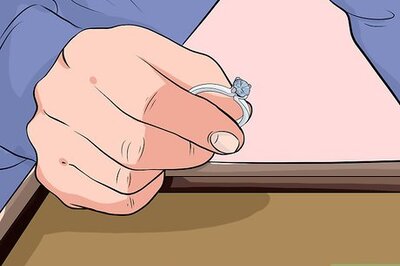



Comments
0 comment